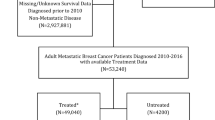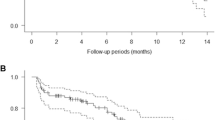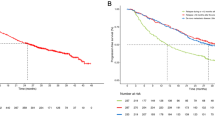Abstract
Purpose
Prognostic effects of circulating tumor cells (CTCs) have been reported in metastatic breast cancer (MBC). However, few phase III trials have investigated the potential role of CTCs in treatment selection. We explored potential relationships between CTCs, efficacy, and differential treatment effects.
Methods
Patients with HER2-negative MBC were randomized to receive either concurrent capecitabine plus docetaxel (XT) or sequential single-agent docetaxel followed by single-agent capecitabine at progression (T → X). Blood samples were collected at baseline, on day 1 of cycles 2 and 3, and at progression. CTCs were counted using the CellSearch® System. The relationship between baseline CTC count and outcomes was investigated using a pre-defined threshold of 2 CTCs/7.5 mL.
Results
At screening, 44% of the 148 enrolled patients had positive CTC score. In multivariate analyses of pooled treatment arms, positive baseline CTC and triple-negative disease were strongly associated with worse progression-free survival (PFS) and overall survival (OS). Patients with positive CTC score at the baseline had worse OS, irrespective of change in CTC (decreased versus remaining positive) at cycle 2. The prognostic effect of baseline CTC count on OS appeared slightly less pronounced in XT-treated pts. compared with T → X.
Conclusions
A baseline CTC count ≥2 CTCs/7.5 mL was associated with worse prognosis. However, some improvement in PFS and OS was shown with concurrent XT, thus baseline CTC could be a predictive marker. As the current trial was not designed to evaluate a change in chemotherapy according to on-treatment CTC changes, prospective investigation is required.




Similar content being viewed by others
References
Hou JM, Krebs MG, Lancashire L et al (2012) Clinical significance and molecular characteristics of circulating tumor cells and circulating tumor microemboli in patients with small-cell lung cancer. J Clin Oncol 30(5):525–532
Cristofanilli M, Budd GT, Ellis MJ et al (2004) Circulating tumor cells, disease progression, and survival in metastatic breast cancer. N Engl J Med 351(8):781–791
Dawood S, Broglio K, Valero V et al (2008) Circulating tumor cells in metastatic breast cancer: from prognostic stratification to modification of the staging system? Cancer 113(9):2422–2430
Giordano A, Giuliano M, De Laurentiis M et al (2012) Circulating tumor cells in immunohistochemical subtypes of metastatic breast cancer: lack of prediction in HER2-positive disease treated with targeted therapy. Ann Oncol 23(5):1144–1150
Giuliano M, Giordano A, Jackson S et al (2011) Circulating tumor cells as prognostic and predictive markers in metastatic breast cancer patients receiving first-line systemic treatment. Breast Cancer Res 13(3):R67
Liu MC, Shields PG, Warren RD et al (2009) Circulating tumor cells: a useful predictor of treatment efficacy in metastatic breast cancer. J Clin Oncol 27(31):5153–5159
Maestro LM, Sastre J, Rafael SB et al (2009) Circulating tumor cells in solid tumor in metastatic and localized stages. Anticancer Res 29(11):4839–4843
Nakamura S, Yagata H, Ohno S et al (2010) Multi-center study evaluating circulating tumor cells as a surrogate for response to treatment and overall survival in metastatic breast cancer. Breast Cancer 17(3):199–204
Pierga JY, Hajage D, Bachelot T et al (2012) High independent prognostic and predictive value of circulating tumor cells compared with serum tumor markers in a large prospective trial in first-line chemotherapy for metastatic breast cancer patients. Ann Oncol 23(3):618–624
Allard WJ, Matera J, Miller MC et al (2004) Tumor cells circulate in the peripheral blood of all major carcinomas but not in healthy subjects or patients with nonmalignant diseases. Clin Cancer Res 10(20):6897–6904
Riethdorf S, Fritsche H, Muller V et al (2007) Detection of circulating tumoro cells in peripheral blood of patients with metastatic breast cancer: a validation study of the Cell Search system. Clin Cancer Res 13(3):920–928
Tibbe AG, Miller MC, Terstappen LW (2007) Statistical considerations for enumeration of circulating tumor cells. Cytometry Part A 71(3):154–162
Hartkopf AD, Wagner P, Wallwiener D, Fehm T, Rothmund R (2011) Changing levels of circulating tumor cells in monitoring chemotherapy response in patients with metastatic breast cancer. Anticancer Res 31(3):979–984
Hayes DF, Cristofanilli M, Budd GT et al (2006) Circulating tumor cells at each follow-up time point during therapy of metastatic breast cancer patients predict progression-free and overall survival. Clin Cancer Res 12(14 Pt 1):4218–4224
Yamamoto D, Sato N, Rai Y et al (2017) Efficacy and Safety of low-dose capecitabine plus docetaxel versus single-agent docetaxel in patients with anthracycline-pretreated HER2-negative metastatic breast cancer: results from the randomized phase III JO21095 trial. Breast Cancer Res Treat 161(3):473–482
O’Shaughnessy J, Miles D, Vukelja S et al (2002) Superior survival with capecitabine plus docetaxel combination therapy in anthracycline-pretreated patients with advanced breast cancer: phase III trial results. J Clin Oncol 20(12):2812–2823
Brookmeyer R, Crowley JJ (1982) A confidence interval for the median survival time. Biometrics 38:29–41
Nole F, Munzone E, Zorzino L et al (2008) Variation of circulating tumor cell levels during treatment of metastatic breast cancer: prognostic and therapeutic implications. Ann Oncol 19(5):891–897
Bidard FC, Mathiot C, Delaloge S, Brain E, Giachetti S, de Cremoux P, Marty M, Pierga JY (2010) Single circulating tumor cell detection and overall survival in nonmetastatic breast cancer. Ann Oncol 21(4):729–733
Pierga JY, Bidard FC, Mathiot C et al (2008) Circulating tumor cell detection predicts early metastatic relapse after neoadjuvant chemotherapy in large operable and locally advanced breast cancer in a phase II randomized trial. Clin Cancer Res 14(21):7004–7010
Rack B, Schindlbeck C, Andergassen U et al (2010) Prognostic relevance of circulating tumor cells in the peripheral blood of primary breast cancer patients. Cancer Res 70:S6–5
Lucci A, Hall CS, Lodhi AK et al (2012) Circulating tumour cells in non-metastatic breast cancer: a prospective study. Lancet Oncol 13(7):688–695
Wallwiener M, Hartkopf AD, Baccelli I et al (2013) The prognostic impact of circulating tumor cells in subtypes of metastatic breast cancer. Breast Cancer Res Treat 137(2):503–510
Bidard FC, Mathiot C, Degeorges A et al (2010) Clinical value of circulating endothelial cells and circulating tumor cells in metastatic breast cancer patients treated first line with bevacizumab and chemotherapy. Ann Oncol 21(9):1765–1771
Smerage JB, Barlow WE, Hortobagyi GN et al (2014) Circulating tumor cells and response to chemotherapy in metastatic breast cancer: SWOG S0500. J Clin Oncol 32(31):3483–3489
Bidard FC, Fehm T, Ignatiadis M et al (2013) Clinical application of circulating tumor cells in breast cancer: overview of the current interventional trials. Cancer Metastasis Rev 32:179–188
Acknowledgements
The authors wish to thank the patients and their families, the study site personnel, and the study team for their participation in the trial. The JO21095 study was sponsored by Chugai Pharmaceutical. Chugai Pharmaceutical was involved in study design, statistical analyses, and data interpretation. Chugai Clinical Research Center Co., Ltd. gathered and managed data, and EPS Corporation Co., Ltd. was responsible for data monitoring. The principal investigators had full access to all study data and had final responsibility for approval and submission of the manuscript.
Author information
Authors and Affiliations
Corresponding author
Ethics declarations
Conflict of interest
H Iwata has received honoraria from Chugai Pharmaceutical and has served as a consultant or advisory role for Chugai Pharmaceutical; N. Masuda has received honoraria from Chugai Pharmaceutical, Astra-Zeneca, and Kyowa Hakko Kirin; S. Hattori has served as a consultant or advisory role for Chugai Pharmaceutical; D. Yamamoto, Y. Sagara, N. Sato, Y. Yamamoto, M. Saito, T. Fujita, S. Oura, J. Watanabe, M. Tsukabe, K Horiguchi, Y. Matsuura, and K. Kuroi declare that they have no conflict of interest.
Ethical approval
The ethical committee approved the study protocol and all patients provided written informed consent before entering the study.
Rights and permissions
About this article
Cite this article
Iwata, H., Masuda, N., Yamamoto, D. et al. Circulating tumor cells as a prognostic marker for efficacy in the randomized phase III JO21095 trial in Japanese patients with HER2-negative metastatic breast cancer. Breast Cancer Res Treat 162, 501–510 (2017). https://doi.org/10.1007/s10549-017-4138-3
Received:
Accepted:
Published:
Issue Date:
DOI: https://doi.org/10.1007/s10549-017-4138-3




